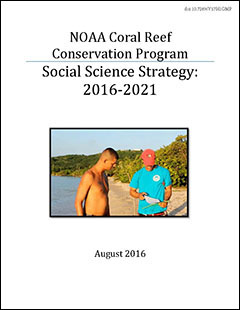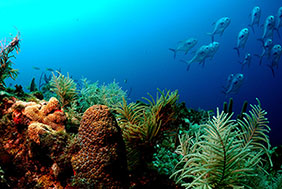-
Home
-
Data & Publications
-
Regional Portals
- About Regional Portals
- Florida
- Navassa Island
- Puerto Rico
- Flower Garden Banks
- U.S. Virgin Islands
- American Samoa
- Commonwealth of the Northern Mariana Islands
- Federated States of Micronesia
- Guam
- Main Hawaiian Islands
- Republic of the Marshall Islands
- Northwestern Hawaiian Islands
- Republic of Palau
- Pacific Remote Island Areas
-
CRCP Activities
- Glossary
National Oceanic and Atmospheric Administration, (NOAA) Coral Reef Conservation Program Social Science Strategy: 2016-2021

The Coral Reef Conservation Program (CRCP) 2016 — 2021 Social Science Strategy builds on the previous (2010-2015) strategy. The new strategy document reviews recent outcomes from the previous social science work plan and then provides recommendations to CRCP in order to address emerging trends, social science and human dimensions needs. In particular, this revised Social Science Strategy will present recommendations and new priorities to guide social science activities supported by the CRCP and its key partners (domestic and international).
The recommendations within this document address a broad range of focus areas, as well as highlight emerging trends and future research needs. In order to be relevant to other parts of the National Ocean Service (NOS) and the wider National Oceanic and Atmospheric Administration (NOAA), this strategy should be considered along with NOS and the Office for Coastal Management (OCM) social science programs of work. Ultimately, some of the activities and plans are linked to the NOAA Social Science Strategy 2015, which seeks to “Integrate social, behavioral, and economic science end-to-end in NOAA's mission and priorities.“
The implementation of these priority recommendations will be influenced by the results of a CRCP Science Assessment and Program Evaluation process. Implementing these new and advanced social science approaches will require coordination with CRCP leadership, SEA Team (Staff Evaluation and Assessment Team) and jurisdictional partners. The application of advanced social science approaches and in particular the combination of biophysical and human dimensions (social and economic) research should lead to results and outcomes that can better inform decision-making and policy for coral reef conservation. These recommendations will also necessitate collaboration with CRCP partners (internal and external to NOAA) with the necessary skills and core competencies to achieve these activities.
There continues to be a need for increasing the level of coordination and collaboration across the major CRCP programs (International, Climate, Land Based Sources of Pollution (LBSP) and Fish) to include human dimensions elements in their respective activities. This strategic document establishes broad guidelines for future research that meets management needs at national and local levels and supports CRCP's international capacity building efforts. Integrated research and monitoring is a key area of emerging interest that will benefit from the incorporation of socioeconomic research with areas of traditional focus such as biophysical and climate research.
Citation: Peter Edwards, Arielle Levine, Maria Dillard and Jarrod Loerzel, (2016), National Oceanic and Atmospheric Administration, (NOAA) Coral Reef Conservation Program Social Science Strategy: 2016-2021, August 2016, Coral Reef Conservation Program, National Ocean Service, Silver Spring, MD. doi:10.7289/V57H1GMP.


